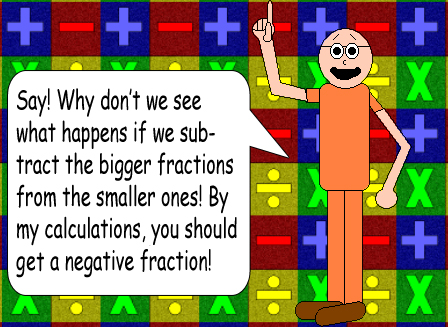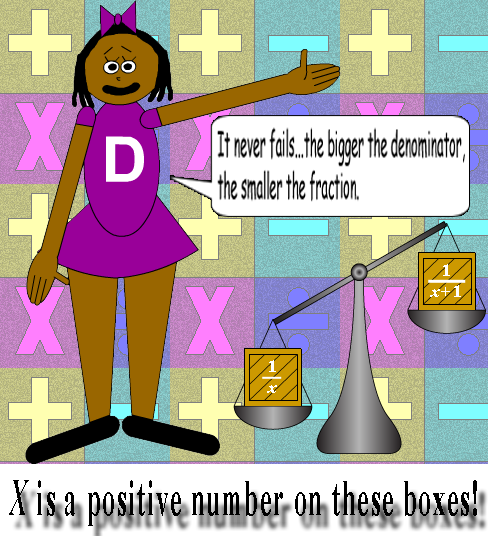Unit Fraction Uniqueness
When you subtract unit fractions with consecutive denominators, something quite interesting happens! Can you figure out the pattern to the table below? The last row will show you the formula!
| Fraction #1 | Fraction #2 | Difference |
| 1/2 | 1/3 | 1/6 |
| 1/3 | 1/4 | 1/12 |
| 1/4 | 1/5 | 1/20 |
| 1/5 | 1/6 | 1/30 |
| 1/6 | 1/7 | 1/42 |
| 1/7 | 1/8 | 1/56 |
| 1/8 | 1/9 | 1/72 |
| 1/9 | 1/10 | 1/90 |
| 1/x | 1/(x+1) | 1/(x^2+x) |
The difference is equal to the product!
By the way, 1/1 = 1, and 1 - ½ = ½. Also, 1 multiplied by 2 is 2 which is 1 + 1. All integers are rational since they're all quotients of 2 other integers. Dividing an integer by itself always gives you 1. (Except with zero)
Zero is also an integer since 0/x = 0, but dividing by zero gives you infinity which is not really a number at all! Multiplying zero by infinity would have to give you any number (especially 1) because if x/0 = ∞, then it's the reciprocal of zero since x could be equal to 1. But x could also be 5, or any other number you can think of! This means 0 × ∞ = 5 or whatever number you thought of! However, math equations are supposed to have only one determinate solution. So 0 × ∞ is indeterminate.
What about 0/0? That's also indeterminate since multiplying any number by 0 gives you 0! Zero is like a vacuum cleaner in multiplication; it sucks up any other numbers it multiplies(or gets multiplied by) and neutralizes them into itself!

| Fraction #1 | Fraction #2 | Difference |
| 1/3 | 1/2 | -1/6 |
| 1/4 | 1/3 | -1/12 |
| 1/5 | 1/4 | -1/20 |
| 1/6 | 1/5 | -1/30 |
| 1/7 | 1/6 | -1/42 |
| 1/8 | 1/7 | -1/56 |
| 1/9 | 1/8 | -1/72 |
| 1/10 | 1/9 | -1/90 |
| 1/(x+1) | 1/x | -1/(x^2+x) |
Subtracting bigger numbers from smaller numbers gives you a negative difference; vice versa gives you the positive difference. That proves that subtraction is not commutative! However, you can make it that way if you consider absolute value...

By the way, even if x is a non-integer, the trick still works out!
Back to Index Page Back to Math Trick Menu
© Derek Cumberbatch


